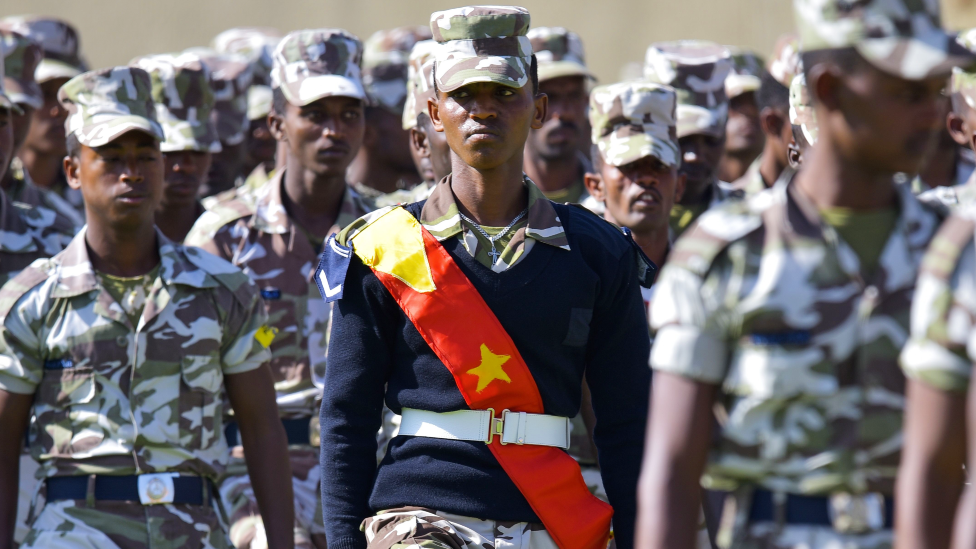Ethiopia's Ministry of Peace at a Time of Internecine Military Assault
"[The TPLF may be able to call on more than 200,000 fighters - from militias in villages to special forces in the regional government.] Because of the changed political dynamics over the last two years, there has been significant recruitment and training in Tigray.""In the west, joint federal and Amhara control may be more established because those forces outnumbered and overpowered local Tigray forces.""There are also more flat areas in the west, giving a conventional army more advantage. [This was unlike the terrain in the] core [of Tigray, around cities in the east, like Mekelle, where it was rugged and mountainous, making it more conducive for guerrilla warfare].""Though federal officials claim the opposite, many Tigrayans seem to oppose the intervention because they believe it is to remove a legitimately elected regional government.""Tigray is blockaded. The TPLF cannot sustain a conventional war."International Crisis Group Ethiopia analyst William Davison
 |
| Tigray's mountainous landscape makes it conducive for guerrilla warfare Getty Images |
"The 72-hour period granted to the criminal TPLF clique to surrender peacefully is now over and our law enforcement campaign has reached its final stage."Ethiopian Prime Minister Ably Ahmed"This humanitarian assistance will now be further reinforced with the opening of a humanitarian access route to be managed under the auspices of the Ministry of Peace."PM Ably's Office
 |
| The regional government in Tigray has a powerful force AFP |
While
the Ethiopian Nobel Laureate honoured for making peace with neighbour
Eritrea which had broken away from Ethiopia and a long war had been
occasioned between them with Ably finally making peace between the two, a
different story emerges with the autonomy of Tigray Province. Tigreans
in their majority province of Ethiopia, a country riven by tribal
differences, are now under military assault by the Ethiopian army.
The
government of Ethiopia refuses to negotiate with the Tigrean leaders
because they are 'terrorists', a familiar mantra well known to those who
study countries at war over sectarian and tribal divides; those who
declare a wish to govern themselves in their heritage, majority
landscapes, are automatically prescribed the role of 'terrorists'. Cue
the Kurds in Turkey, the Sunni Syrians in Shia-dominated Syria.
Close
to 43,000 Ethiopian refugees have fled to Sudan. The humanitarian
coordinator in Ethiopia for the United Nations has no idea what and
where and how the described humanitarian access route referred to by is;
she's never heard of it, seen it, or suspected its existence. Yet the
Ministry of Peace in a country that has declared part of its population
'terrorists' and denies bombing civilian areas, has launched a military
campaign against that population.
Ethiopian
authorities claim to be bearing down on the Tigray capital region.
While at the same time Ethiopian army chief Birhanu Jula claimed that
WHO head Tetros Adhanon Ghebreyesus has been procuring arms and
diplomatic backing for the TPLF whom he once served as a minister when
the TPLF led Ethiopia's coalition government. He, according to
Ethiopia's government is a 'criminal'. Dr.Tedros responded by denying
the accusation, calling on both sides to work for peace.
Hundreds
if not thousands have been killed in the three-week-old conflict, along
with the tens of thousands of refugees crowding into Sudan. Last week a
federal air strike injured university students in the Tigray capital of
Mekelle with its half-million population which the Tigray People's
Liberation Front rules. "It [the air strike] resulted in heavy casualties of many university students and other civilians", noted a post from the TPLF on Facebook.
"Our defence forces are moving forward and closing in on Mekelle. There are a number of towns that have fallen",
stated government spokesperson Redwan Hussein of the war that has
pitted the central government against one of the most heavily
militarized of ten ethnic states that comprise Ethiopia. Claims by the
government are that the TPLF is holding power illegally in Tigray while
the TPLF responds that the war is an unconstitutional assault on
regional rights.
According
to UN estimates, 1.1 million Ethiopians will require humanitarian aid
resulting from the conflict. It is unable to enter Tigray to deliver aid
given the bombing by government forces. Those that have fled to Sudan
are also in desperate need of help. Though both sides claim that serious
damage has been inflicted on the other side, the Deputy Director of the
Africa Program at the International Crisis Group states "...Federal forces appear closer to Mekelle amid reports of heavy combat between the two sides yesterday."
But
for some Ethiopians good news comes not too soon as Israel’s
Ethiopian-born Minister of Immigrant Absorption is set to return briefly
to Ethiopia to bring back to Israel hundreds of Ethiopian Jews.
Minister Pnina Tamano-Shata will fly to Ethiopia with representatives
of the Jewish Agency, where they're prepared to meet with a group of
prospective immigrants from Addis Ababa and Gondar, and will accompany
them back to Israel on two Jewish Agency planes. Called Beta-Israel,
thousands have left Ethiopia over the years to become Israeli citizens.
 |
| Jewish Agency chairman Isaac Herzog (center) and Minister of Aliyah and Integration Pnina Tamano-Shata welcome 119 Ethiopian immigrants to Israel, May 21, 2020. Photo: Shlomi Amsalem. |
Labels: Conflict, Ethiopia, Ethnic Divides, Tribalism

<< Home